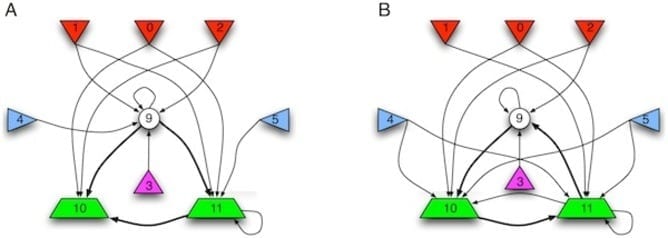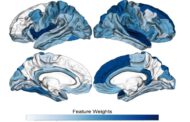
Two evolved HMG networks.
The shapes represent the 9 Markov variables (bits) at time that are active in the network (bits 6, 7, and 8 are connected to the network, but are not functional at generation 49,000 and not rendered here). The central feed-forward circuit for navigation is rendered in bold arrows. Color codes and numbering as in Fig. 2. A: The network evolved in our focus experiment that achieved 88% of possible fitness. B: Another network that evolved in an independent run, and that implements a variant of the hierarchical temporary memory algorithm that creates an expectation of future sensory signals. In contrast to the controller that evolved in panel (A), this one uses a feed-back strategy between memory and motors. This controller achieves 74% of maximal fitness within a random maze environment.
Researcher David Silver and colleagues designed a computer program capable of beating a top-level Go player — a marvelous technological feat and important threshold in the development of artificial intelligence, or AI. It stresses once more that humans aren’t at the center of the universe, and that human cognition isn’t the pinnacle of intelligence.
I remember well when IBM’s computer Deep Blue beat chess master Garry Kasparov. Where I’d played — and lost to — chess-playing computers myself, the Kasparov defeat solidified my personal belief that artificial intelligence will become reality, probably even in my lifetime. I might one day be able to talk to things similar to my childhood heroes C-3PO and R2-D2. My future house could be controlled by a program like HAL from Kubrick’s “2001” movie.
As a researcher in artificial intelligence, I realize how impressive it is to have a computer beat a top Go player, a much tougher technical challenge than winning at chess. Yet it’s still not a big step toward the type of artificial intelligence used by the thinking machines we see in the movies. For that, we need new approaches to developing AI.
Intelligence is evolved, not engineered
To understand the limitations of the Go milestone, we need to think about what artificial intelligence is — and how the research community makes progress in the field.
Typically, AI is part of the domain of engineering and computer science, a field in which progress is measured not by how much we learned about nature or humans, but by achieving a well-defined goal: if the bridge can carry a 120-ton truck, it succeeds. Beating a human at Go falls into exactly that category.
I take a different approach. When I talk about AI, I typically don’t talk about a well-defined matter. Rather, I describe the AI that I would like to have as “a machine that has cognitive abilities comparable to that of a human.”
Admittedly, that is a very fuzzy goal, but that is the whole point. We can’t engineer what we can’t define, which is why I think the engineering approach to “human level cognition” — that is, writing smart algorithms to solve a particularly well-defined problem — isn’t going to get us where we want to go. But then what is?
We can’t wait for cognitive- and neuroscience, behavior biology or psychology to figure out what the brain does and how it works. Even if we wait, these sciences will not come up with a simple algorithm explaining the human brain.
What we do know is that the brain wasn’t engineered with a simple modular building plan in mind. It was cobbled together by Darwinian evolution — an opportunistic mechanism governed by the simple rule that whoever makes more viable offspring wins the race.
This explains why I work on the evolution of artificial intelligence and try to understand the evolution of natural intelligence. I make a living out of evolving digital brains.
Algorithms vs. improvisation
To return to the Go algorithm: in the context of computer games, improving skill is possible only by playing against a better competitor.
The Go victory shows that we can make better algorithms for more complex problems than before. That, in turn, suggests that, in the future, we could see more computer games with complex rules providing better opponent AI against human players. Chess computers have changed how modern chess is played, and we can expect a similar effect for Go and its players.
This new algorithm provides a way to define optimal play, which is probably good if you want to learn Go or improve your skills. However, since this new algorithm is pretty much the best possible Go player on Earth, playing against it nearly guarantees you’ll lose. That’s no fun.
Fortunately, continuous loss doesn’t have to happen. The computer’s controllers can make the algorithm play less well by either reducing the number of moves it thinks ahead, or — and this is really new — using a less-developed deep neural net to evaluate the Go board.
But does this make the algorithm play more like a human, and is that what we want in a Go player? Let us turn to other games that have fewer fixed rules and instead require the player to improvise more.
Imagine a first person shooter, or a multiplayer battle game, or a typical role-playing adventure game. These games became popular not because people could play them against better AI, but because they can be played against, or together with, other human beings.
It seems as if we are not necessarily looking for strength and skill in opponents we play, but for human characteristics like being able to surprise us, to see the same humor and maybe to even empathize with us.
Learn more: Evolving our Way to Artificial Intelligence
The Latest on: Evolving artificial intelligence
[google_news title=”” keyword=”evolving artificial intelligence” num_posts=”10″ blurb_length=”0″ show_thumb=”left”]
via Google News
The Latest on: Evolving artificial intelligence
- U.S. Government Needs to ‘Get It Right’ on Artificial Intelligenceon April 26, 2024 at 6:59 pm
We can't afford to get this wrong—again,” Shalanda Young, the director of the Office of Management and Budget, tells TIME.
- Artificial Intelligence: Major Cyber Threats for Law Firms in 2024on April 26, 2024 at 6:18 am
Because trust is crucial in a lawyer-client relationship, it is of the utmost importance that law firms maintain the highest standards in data security.
- What You Can Learn From The Security Industry's Evolutionon April 26, 2024 at 4:45 am
The security industry is in the midst of a major transformation—and is emerging as a dynamic source of technology innovation and business resilience.
- 1 Unstoppable Artificial Intelligence (AI) Stock to Buy and Hold Foreveron April 26, 2024 at 4:15 am
Many investors are also looking to cash in by investing in those corporations that seem ahead of the pack. There are many options, but e-commerce titan Amazon (NASDAQ: AMZN) is one of the best. Let's ...
- AI is evolving and investors need to change with it. Here’s what to expect.on April 26, 2024 at 4:10 am
Continuous education and advocacy for responsible AI development are essential for both investors and industry stakeholders. Investors should actively engage in discussions surrounding AI ethics, ...
- Forget Nvidia: 2 Artificial Intelligence (AI) Stocks to Buy Insteadon April 25, 2024 at 8:51 am
Evolving business strategies in the tech sector might transform your investment options. Two adaptable tech giants could be more appealing than Nvidia right now.
- The Impact of Artificial Intelligence on Job Market Trendson April 25, 2024 at 3:49 am
Are robots taking over our jobs? Will artificial intelligence make human labor obsolete? These questions have been wandering over the job market for years, sparking debates and fears about the future ...
- Regulating Wartime Artificial Intelligenceon April 24, 2024 at 9:04 pm
The prevalence of sophisticated narrow AI which supports human decision making has increased, as seen in the war in Ukraine. The Ukrainian armed forces developed an Android application to reduce the ...
- Utah’s Artificial Intelligence Act swings into full-force May 1ston April 24, 2024 at 5:00 pm
With these regulations, Utah is the first state to establish a legal framework for the evolving use of artificial intelligence. For entities that are “regulated occupations” which require one to ...
- Will Artificial Intelligence Steal My Job?on April 23, 2024 at 6:43 am
The jobs that AI will replace are “simple, menial jobs” that involve basic data entry and basic problem-solving, wrote AI researcher Regina Grogan, in an email. The reason for this is that AI lacks ...
via Bing News







